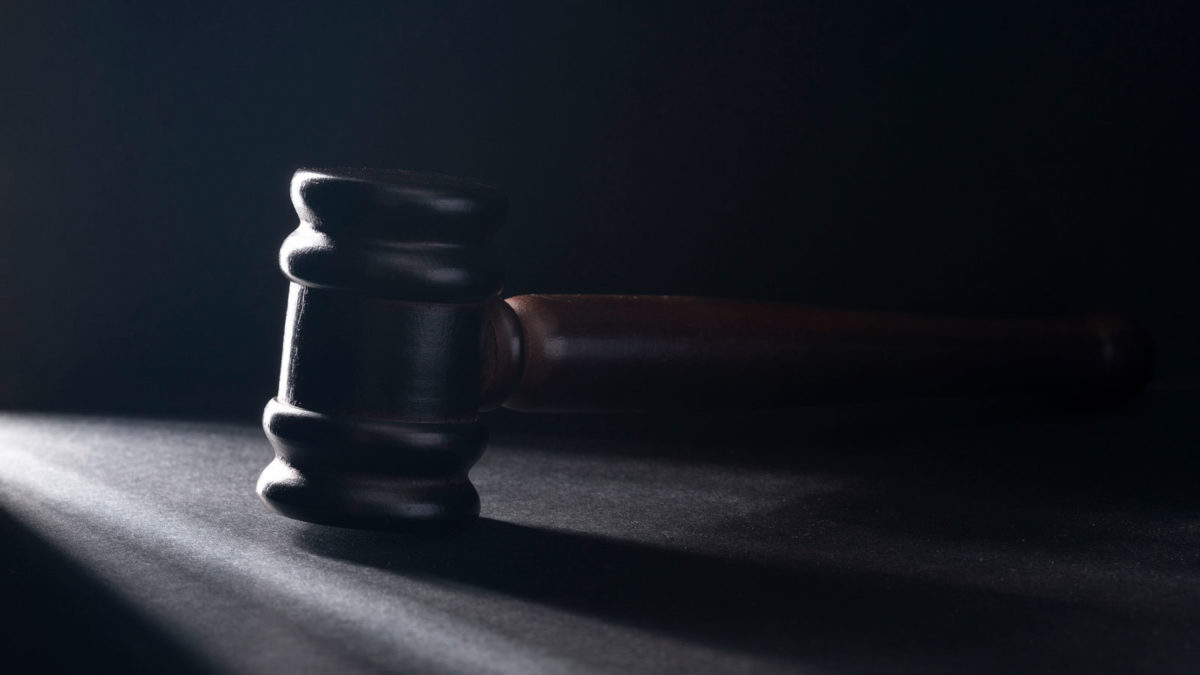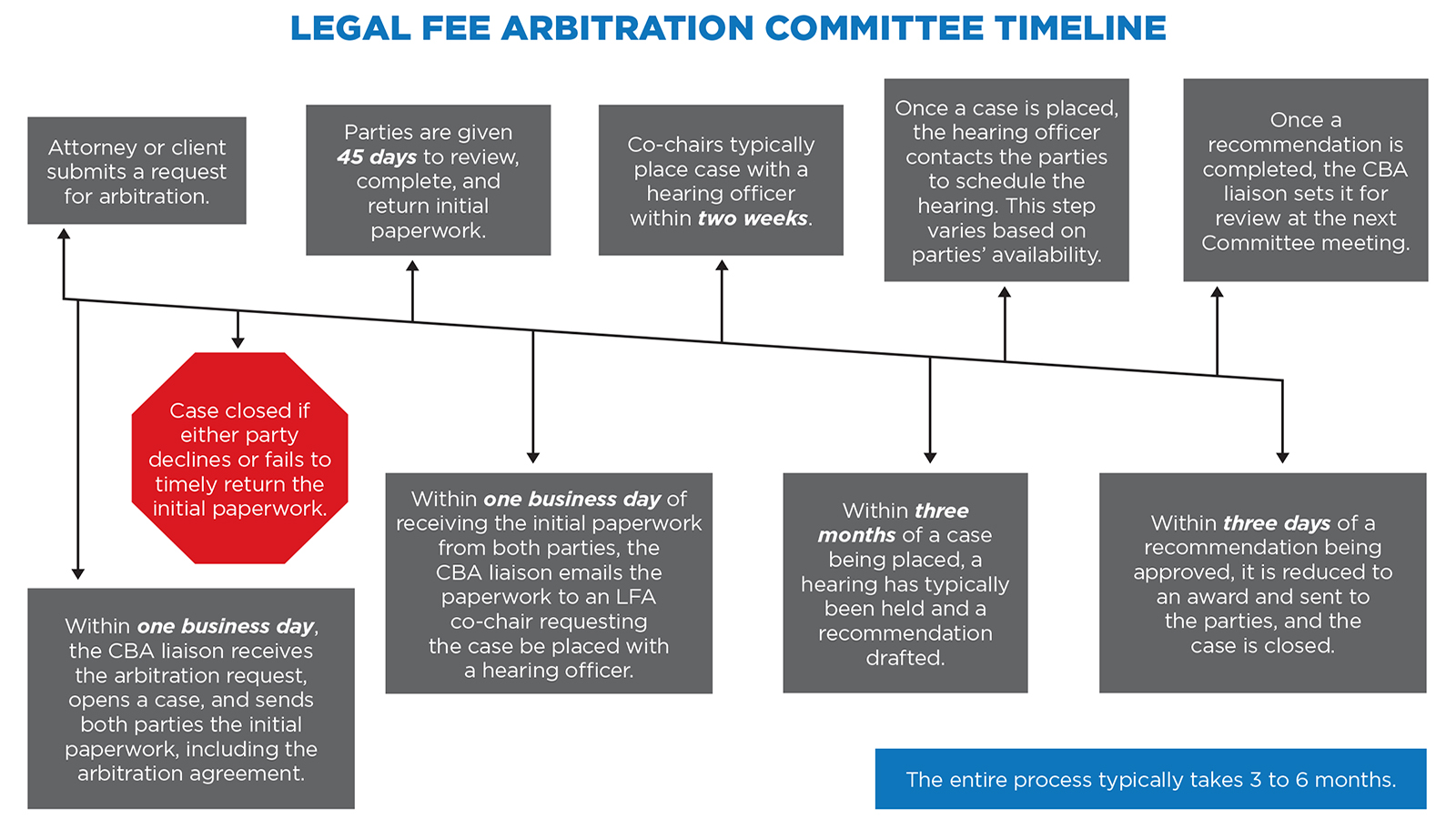
Legal Fee Dispute Arbitration through the CBA
April 2022
Download This Article (.pdf)
The Colorado Bar Association established the Legal Fee Arbitration Committee, enabling expeditious resolution of fee disputes between lawyers practicing law in Colorado and their clients. This article describes this fee arbitration process.
The Colorado Bar Association’s (CBA) Legal Fee Arbitration Committee (LFAC or Committee) offers an expeditious process for resolving fee disputes among lawyers practicing in Colorado and their clients, at no cost to the participants. This article addresses the process through which the LFAC determines fee disputes.
The Scope of Legal Fee Arbitration
The CBA established the LFAC, a joint committee comprising CBA and Denver Bar Association members, pursuant to the CBA’s bylaws.1 The number of active LFAC members is approximately 85. The LFAC is a standing committee with a directive to arbitrate fee and cost disputes between attorneys and clients as well as fee and cost disputes between attorneys and experts. Non-lawyers may actively serve on the LFAC but may not conduct arbitrations.
Pursuant to CBA’s directive, the LFAC promulgated its own rules, which are available upon request from the CBA’s LFAC liaison and are reprinted at the end of this article for reference.2 The LFAC’s rules state its essential purpose and responsibility:
The object and purpose of the Committee shall be to determine disputes involving attorney’s fees, expert fees advanced by an attorney, and costs, pursuant to applicable arbitration law. Services of the Committee shall be available to all persons, firms and corporations who are or have been represented by an attorney practicing in Colorado . . . whether or not such attorneys are members of the Colorado Bar Association or Denver Bar Association.3
Submitting a Dispute
Parties to a fee dispute must mutually agree that it be arbitrated by the LFAC, with two notable exceptions: where a Colorado judge issues an order assigning a matter for arbitration by the LFAC, and where the Office of Attorney Regulation Counsel (OARC) makes a direct referral for LFAC arbitration. Referral from a Colorado judge or the OARC frequently occurs in circumstances requiring determination of the parties’ financial obligations to each other.
Matters submitted pursuant to the parties’ mutual agreement are most often based on a provision in the parties’ fee agreement requiring fee dispute resolution through the LFAC. Such provisions give the LFAC jurisdiction over the dispute. Frequently, parties involved in a fee dispute mutually agree to the LFAC process even in the absence of an explicit provision directing LFAC resolution.
Once the parties have jointly agreed to fee arbitration by the LFAC, each must complete an online legal fee arbitration request form and attach the court order referring the matter, if applicable. The LFAC’s website includes a recorded Zoom presentation of the CBA-CLE Legal Fee Arbitration and Ethics CLE,4 which explains the fee arbitration process in detail. The CBA LFAC liaison then sends each party initial paperwork to complete and return within 45 days. Each party must submit documents reflecting the agreement to LFAC arbitration, the general nature of the dispute, and the amount in dispute. The description of the nature of the dispute helps with assigning the matter to an LFAC member with expertise in the practice area, if available. Because the LFAC resolution process may be initiated by either party, each must identify the amount claimed for either payment or refund. If an amount is not claimed, it will not be considered in the final award.
Following the requisite submissions, there is a 30-day waiting period to permit the parties an opportunity to resolve the matter between themselves.5 Once the 30 days have elapsed, the matter is submitted to an LFAC chairperson for assignment to an LFAC member for arbitration. The chairperson tries to assign arbitrations to committee members with experience in the practice area involved in the dispute.

Conducting the Arbitration
The arbitrator must first determine whether there are conflicts. The CBA liaison conducts an initial conflicts check, and once the matter is assigned to a Committee member for arbitration, the selected arbitrator performs a conflict check.6 Potential conflicts are those set forth in the Colorado Rules of Professional Conduct (Colo. RPC) and Article IV of the LFAC Rules. If no conflicts exist, the arbitrator will contact the parties and schedule dates for the mutual submission and exchange of exhibits and documents pertinent to the matter, and a date for the arbitration. Parties to the arbitration may present evidence, including lay and expert witness testimony, and may cross-examine any other party. The arbitration is conducted according to the Colorado Uniform Arbitration Act, CRS §§ 13-22-201 et seq.
Colo. RPC 1.5 is central to resolving the dispute, and all attorneys should be familiar with its provisions. Pursuant to Article V of the LFAC Rules, the arbitrator will consider the factors set forth in Rule 1.5 in his or her recommendation, which is then presented to the Committee.
While myriad circumstances give rise to fee disputes, there are some common and recurrent themes. Many disputes are the result of a lack of effective communication between the attorney and client leading to disagreement concerning the value of services provided. The number of matters arbitrated through the LFAC ranges between 25 and 50 a year.
The Decision
Following the arbitration, the arbitrator submits a summary of the arbitration, including pertinent evidence and testimony, to the full LFAC, under Article IV.f. of the LFAC Rules. This submission includes an analysis of the evidence under Colo. RPC 1.5 and other authority considered by the arbitrator, and it sets forth the proposed award. Before the arbitrator’s submission, the parties’ names and all other identifying information is redacted to ensure anonymity, and thus impartiality, in the decision-making process.
All LFAC members then convene a roundtable discussion at the LFAC’s monthly meeting to decide the final award. Monthly case discussions are robust and include many questions, observations, and shared insights. Following this discussion, the attending members, in person or by telephone, vote on the proposed dispute resolution, which may or may not reflect the arbitrator’s initial summary conclusion. The ultimate award is decided by a majority vote of the attending LFAC members and may or may not reflect the initial disposition proposed by the arbitrator. In the event the Committee’s disposition is different from the arbitrator’s proposal, the arbitrator must agree to the Committee’s award. The arbitrator and the LFAC chairperson who assigned the matter for arbitration sign the final award, which is mailed to the parties. The award simply states the financial disposition of the matter and includes no information regarding the final award, the arbitrator’s proposed award, or LFAC discussions. Under Article VI of the LFAC Rules, the arbitrator’s submission and LFAC discussions are privileged and will not be disclosed.

Because the fee arbitration process ultimately determines a winner and a loser, either party potentially may be disgruntled. The parties to a dispute must appreciate that LFAC members are primarily active practicing attorneys who, at no cost to the parties and with no monetary interest in the matter, collectively strive to achieve fair outcomes, in accordance with law, for all parties involved in the dispute.
Conclusion
The LFAC offers a no-cost, expeditious forum for resolving fee disputes among attorneys and clients. All practitioners should keep this option in mind when facing a fee dispute.
 _______________________________________________________
_______________________________________________________
Colorado Bar Association Legal Fee Arbitration Committee Rules
-
- The Chairperson(s) of the Committee shall, as soon as practical upon receipt by the Committee of a complaint, refer the entire matter to an arbitrator.
- Upon receipt of the assigned case, the appointed arbitrator shall determine if the appointed arbitrator has a known, direct, and material interest in the outcome of the arbitration proceeding, or a known, existing, and substantial relationship with a party, their counsel or representative, a witness, or another arbitrator. Any arbitrator with such an interest or relationship shall not serve as an arbitrator. In such cases, the Chairperson(s) of the Legal Fee Arbitration Committee shall appoint another arbitrator.
- A party to the fee dispute may object to the appointment of an arbitrator if the arbitrator discloses or a reasonable person would believe that the arbitrator’s impartiality would be affected by:
- a financial or personal interest;
- a current or previous relationship with any of the parties to the agreement to arbitrate or the arbitration proceeding, their counsel or representatives, a witness, or another arbitrator; or
- other cause that a reasonable person would believe affects the impartiality of the arbitrator.
- The arbitrator subject to an objection by a party to the appointment, shall determine if there is a reasonable probability that the arbitrator’s impartiality would be affected. If the arbitrator determines that the impartiality would likely be affected, the arbitrator shall decline the appointment and ask the chairperson(s) to appoint another arbitrator.
- The arbitrator shall, upon submission of a matter to it by the Chairperson(s) of the Committee, hear the matter and for such purpose may call in and examine witnesses, including the complainant and the person being complained against and take such other action as it deems necessary and appropriate, pursuant to applicable arbitration law. The arbitrator shall reduce to writing award amounts.
- The Committee shall provide the arbitrator the opportunity to discuss the award during the next Committee meeting. After an opportunity to discuss with the Committee, the arbitrator shall make the final decision with regard to the award.
- The written final award of the arbitrator shall be signed by the arbitrator and the Committee chair or one co-chair, and submitted to the executive director of the Colorado Bar Association (or his/her designee) who shall forward copies of the same to the complainant and the party being complained against and shall be binding on both parties. A copy also shall be forwarded to the arbitrator.
- The Committee may decline to accept jurisdiction of any complaint or dispute, or may surrender such jurisdiction, if in the appointed arbitrator’s opinion, it becomes apparent that there is no ground for the complaint or dispute, that the matter is moot, or if for any reason the case is deemed inadequate or unwarranted by the arbitrator.
Related Topics
Notes
1. Appx. D to the Colorado Bar Association Bylaws (rev. July 1, 2021).
2. The current CBA liaison to the LFAC is Mia Kontnik, mkontnik@cobar.org.
3. CBA Legal Fee Arbitration Committee Rules, art. II.
4. https://www.cobar.org/legalfee.
5. CBA Legal Fee Arbitration Committee Rules, art. III.
6. CBA Legal Fee Arbitration Committee Rules, art. IV.b.
LFAC Membership
Membership in the CBA’s Legal Fee Arbitration Committee is a rewarding and meaningful way for lawyers to gain valuable arbitration experience. LFAC membership also provides unparalleled insight into fee dispute issues, including how disputes may be avoided, the significance of effective attorney-client communication, and ethical billing practices. Membership is open to Colorado lawyers under Article 1(b) of the LFAC Rules. If you would like to serve on the LFAC, contact CBA liaison Mia Kontnik, mkontnik@cobar.org.


